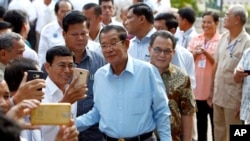Cambodia’s national election body has invited international observers to monitor the July general election, which is set to be a landslide for the ruling Cambodian People’s Party and Prime Minister Hun Sen after the main opposition party was dissolved last year.
International delegates are required by law to be invited to observe Cambodian elections. Local non-governmental groups also received invitations.
Both local and international observers will be able to submit written reports of their findings after the vote concludes, but local groups may be reticent to take part following months of government-led suppression of criticism.
During the Senate election in February, two local election monitors boycotted the proceedings.
Korn Savang, an election monitor at Comfrel, a local pro-democracy group, said a decision on whether or not the group will take part in the election would be made after the closure of party registration in May.
“It’s important that candidates of political parties are allowed to compete. No matter which party they are in or which party they work for, all their rights, [including] the rights of the 118 political candidates who were banned, must be ensured so they are able to join other political parties,” he said, referring to a group of opposition Cambodia National Rescue Party politicians who were banned from politics when the party was dissolved.
The CNRP, which gained more than 40 percent of the vote in local elections last year, also saw its president, Kem Sokha, jailed on treason charges over an alleged foreign-backed conspiracy to topple Hun Sen.
Sam Kuntheamy, executive director of Nicfec, another local election observer, said a combination of the tense political climate and a lack of funding made the group’s participation uncertain.
Dim Sovannarom, National Election Committee spokesman, could not be reached for comment on Wednesday.




